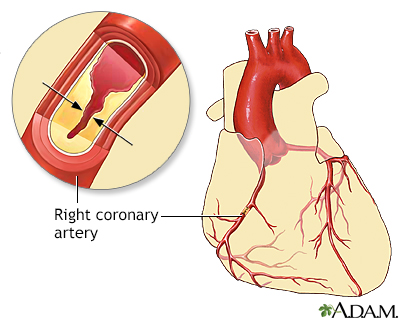Familial lipoprotein lipase deficiency
Type I hyperlipoproteinemia; Familial chylomicronemia; Familial LPL deficiency
Familial lipoprotein lipase deficiency is a group of rare genetic disorders in which a person lacks a protein needed to break down fat molecules. The disorder causes a large amount of fat to build up in the blood.
Images

Causes
Familial lipoprotein lipase deficiency is caused by a defective gene that is passed down through families.
People with this condition lack an enzyme called lipoprotein lipase. Without this enzyme, the body cannot break down fat from digested food. Fat particles called chylomicrons build up in the blood.
Risk factors include a family history of lipoprotein lipase deficiency.
The condition usually first develops during infancy or childhood.
Symptoms
Symptoms may include any of the following:
- Abdominal pain (may appear as colic in infants)
- Loss of appetite
- Nausea, vomiting
- Pain in the muscles and bones
- Enlarged liver and spleen
- Failure to thrive in infants
- Fatty deposits in the skin (xanthomas)
- High triglyceride levels in the blood
- Pale retinas and white-colored blood vessels in the retinas
- Chronic inflammation of the pancreas
- Yellowing of the eyes and skin (jaundice)
Exams and Tests
Your health care provider will perform a physical examination and ask about your symptoms.
Blood tests will be done to check cholesterol and triglyceride levels. Sometimes, a special blood test is done after you are given blood thinners through a vein. This test looks for lipoprotein lipase activity in your blood.
Genetic tests may be done.
Treatment
Treatment aims to control the symptoms and blood triglyceride levels with a very low-fat diet. Your provider will likely recommend that you eat no more than 20 grams of fat per day to prevent the symptoms from coming back.
Twenty grams of fat is equal to one of the following:
- Two 8-ounce (240 milliliters) glasses of whole milk
- 4 teaspoons (9.5 grams) of margarine
- 4 ounces (113 grams) serving of meat
The average American diet has a fat content of up to 45% of total calories. Fat-soluble vitamins A, D, E, and K and mineral supplements are recommended for people who eat a very low-fat diet. You may want to discuss your diet needs with your provider and a registered dietitian.
Pancreatitis that is related to lipoprotein lipase deficiency responds to treatments for that disorder.
Support Groups
These resources can provide more information on familial lipoprotein lipase deficiency:
- National Organization for Rare Disorders -- rarediseases.org/rare-diseases/familial-lipoprotein-lipase-deficiency
- NIH Genetics Home Reference -- ghr.nlm.nih.gov/condition/familial-lipoprotein-lipase-deficiency
Outlook (Prognosis)
People with this condition who follow a very low-fat diet can live into adulthood.
Possible Complications
Pancreatitis and recurrent episodes of abdominal pain may develop.
Xanthomas are not usually painful unless they are rubbed a lot.
When to Contact a Medical Professional
Contact your provider for screening if someone in your family has lipoprotein lipase deficiency. Genetic counseling is recommended for anyone with a family history of this disease.
Prevention
There is no known prevention for this rare, inherited disorder. Awareness of risks may allow early detection. Following a very low-fat diet can improve the symptoms of this disease.
Related Information
EnzymeAutosomal recessive
High blood cholesterol levels
Failure to thrive
References
Genest J, Mora S, Libby P. Lipoprotein disorders and cardiovascular disease. In: Libby P, Bonow RO, Mann DL, Tomaselli GF, Bhatt DL, Solomon SD, eds. Braunwald's Heart Disease: A Textbook of Cardiovascular Medicine. 12th ed. Philadelphia, PA: Elsevier; 2022:chap 27.
Semenkovich CF, Goldberg IJ. Disorders of lipid metabolism. In: Melmed S, Auchus RJ, Goldfine AB, Koenig RJ, Rosen CJ, eds. Williams Textbook of Endocrinology. 14th ed. Philadelphia, PA: Elsevier; 2020:chap 41.
BACK TO TOPReview Date: 5/12/2023
Reviewed By: Sandeep K. Dhaliwal, MD, board-certified in Diabetes, Endocrinology, and Metabolism, Springfield, VA. Also reviewed by David C. Dugdale, MD, Medical Director, Brenda Conaway, Editorial Director, and the A.D.A.M. Editorial team.

Health Content Provider
06/01/2025
|
A.D.A.M., Inc. is accredited by URAC, for Health Content Provider (www.urac.org). URAC's accreditation program is an independent audit to verify that A.D.A.M. follows rigorous standards of quality and accountability. A.D.A.M. is among the first to achieve this important distinction for online health information and services. Learn more about A.D.A.M.'s editorial policy, editorial process and privacy policy. A.D.A.M. is also a founding member of Hi-Ethics. This site complied with the HONcode standard for trustworthy health information from 1995 to 2022, after which HON (Health On the Net, a not-for-profit organization that promoted transparent and reliable health information online) was discontinued. |
The information provided herein should not be used during any medical emergency or for the diagnosis or treatment of any medical condition. A licensed medical professional should be consulted for diagnosis and treatment of any and all medical conditions. Links to other sites are provided for information only -- they do not constitute endorsements of those other sites. © 1997- 2025 A.D.A.M., a business unit of Ebix, Inc. Any duplication or distribution of the information contained herein is strictly prohibited.
